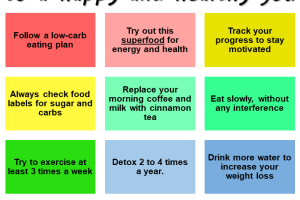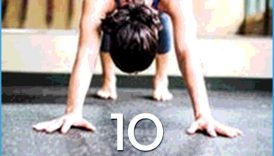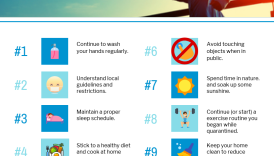Level Up Your Health: Tips for a Better Lifestyle

Importance of Health and Well-being
In today’s fast-paced world, the significance of health and well-being is often overshadowed by the hustle of daily life. Yet, it serves as the cornerstone for a fulfilling and productive existence. Without good health, even the most ambitious plans can falter. Each individual’s experience with their well-being is unique, colored by personal ambitions, routines, and challenges. Consider Jane, a busy professional who juggles her career while raising two children. Initially, she put her own health on the back burner, believing she could manage on minimal rest and unhealthy snacks. However, this approach left her feeling fatigued and uninspired. Realizing that her well-being impacted not only her health but also her productivity and relationships, she made a deliberate effort to prioritize it. By establishing a balanced routine, Jane found herself with more energy and focus, enabling her to engage fully in both her work and personal life.
- Level Up Your Health: Tips for a Better Lifestyle
- Importance of Health and Well-being
- The Dimensions of Health
- Benefits of Prioritizing Well-being
- Nutrition
- Balanced Diet for Improved Health
- Components of a Balanced Diet
- Benefits of a Balanced Diet
- Benefits of Hydration
- Key Benefits of Staying Hydrated
- Conclusion
- Physical Activity
- Exercise Routines for Better Fitness
- Effective Exercise Routines
- Tips for a Successful Routine
- Importance of Sleep for Recovery
- Benefits of Quality Sleep
- Conclusion
- Mental Health
- Stress Management Techniques
- Effective Stress Management Techniques
- Tips for Implementation
- Practicing Mindfulness
- Benefits of Practicing Mindfulness
- Simple Mindfulness Practices
- Conclusion
- Wellness Practices
- Self-care Strategies
- Effective Self-care Strategies
- Tips for Implementing Self-care
- Benefits of Regular Health Check-ups
- Key Benefits of Regular Health Check-ups
- Recommended Schedule for Check-ups
- Conclusion
The Dimensions of Health
Health isn’t merely the absence of illness; it’s a holistic framework that includes various dimensions:
- Physical Health: Maintaining fitness and nutrition to support bodily functions.
- Mental Health: Managing stress, anxiety, and emotional stability.
- Social Health: Building and nurturing relationships that foster support and community.
When these dimensions are aligned, individuals can thrive in their personal and professional pursuits.
Benefits of Prioritizing Well-being
Ensuring that health and well-being take center stage yields numerous benefits:
- Enhanced Energy Levels: A healthier lifestyle fuels increased vitality.
- Improved Mood: Regular physical activities and balanced nutrition contribute to a positive outlook.
- Increased Productivity: When individuals feel good, they can accomplish more and with greater satisfaction.
Ultimately, investing in health and well-being transforms one’s life. Through small, consistent changes, anyone can craft a lifestyle that promotes not just survival, but flourishing. This journey may start small, but it creates a ripple effect that can enhance every aspect of one’s existence.
Nutrition
Balanced Diet for Improved Health
Transitioning from the broader topic of health and well-being, nutrition plays a vital role in achieving optimal physical and mental health. A balanced diet isn’t just about eating fewer calories or cutting out entire food groups; it’s about ensuring the body gets the right mix of nutrients it needs to function efficiently. Take Mark, for instance, a college student who often relied on fast food due to his hectic schedule. He soon realized that this diet left him feeling sluggish and unfocused during classes. By incorporating more fruits, vegetables, and whole grains into his meals, he started experiencing significant improvements in his energy levels and concentration.
Components of a Balanced Diet
For a comprehensive approach, a balanced diet should include:
- Fruits and Vegetables: Aim for at least five servings a day to provide essential vitamins and minerals.
- Proteins: Incorporate lean meats, beans, and legumes to support muscle repair and overall health.
- Whole Grains: Opt for brown rice, quinoa, and whole-grain bread for sustained energy throughout the day.
- Healthy Fats: Include sources like avocados, nuts, and olive oil to promote heart health.
Benefits of a Balanced Diet
A balanced diet has several benefits, including:
- Improved mood and mental clarity
- Strengthened immune system
- Enhanced muscle performance
Benefits of Hydration
Alongside nutrition, hydration stands as a critical pillar of health. Many people underestimate the importance of drinking enough water, which can lead to various issues, from headaches to poor concentration. Consider Lisa, a freelance graphic designer who often forgot to hydrate while immersed in work. It wasn’t until she began feeling fatigued and unfocused that she acknowledged her lack of water intake. By setting reminders to drink water throughout the day, she experienced increased clarity and overall well-being.
Key Benefits of Staying Hydrated
Hydration impacts nearly every function in the body and offers numerous benefits:
- Regulates Body Temperature: Staying hydrated helps maintain optimal body functions.
- Supports Digestion: Water aids in breaking down food, allowing for better nutrient absorption.
- Boosts Energy Levels: Dehydration can lead to fatigue and reduced physical performance.
Conclusion
By focusing on a balanced diet and adequate hydration, individuals can make significant strides towards improved health. Both elements work synergistically to enhance not only physical fitness but also mental wellness, making them indispensable in any health and well-being journey. Prioritizing these aspects of nutrition leads to a fuller, more vibrant life.
Physical Activity
Exercise Routines for Better Fitness
Building on the critical role of nutrition, physical activity emerges as another essential component for achieving overall health and well-being. Regular exercise not only strengthens the body but also uplifts the mind, creating a more balanced life. Engaging in consistent physical activity can help individuals combat stress, boost mood, and enhance physical fitness. Take Chris, a desk-bound software developer who struggled with low energy levels and occasional anxiety. By integrating simple exercise routines into his daily life—such as morning stretches and a brisk walk during lunch breaks—he found himself feeling more energized and less stressed.
Effective Exercise Routines
There are various exercise routines that can cater to different fitness levels and preferences:
- Cardiovascular Exercises: Activities like running, swimming, or cycling improve cardiovascular health and stamina.
- Strength Training: Using weights or resistance bands helps build muscle mass and bone density. Aim for at least two sessions a week.
- Flexibility Exercises: Incorporating yoga or Pilates improves flexibility and reduces the risk of injury.
- High-Intensity Interval Training (HIIT): Short bursts of intense activity followed by rest can be efficient for fat loss and overall fitness.
Tips for a Successful Routine
To stick with an exercise routine, consider these tips:
- Set realistic goals to track progress.
- Choose activities you enjoy to make exercising fun.
- Schedule workout sessions just like any other appointment.
Importance of Sleep for Recovery
Transitioning into another vital aspect of physical activity, sleep plays a crucial role in recovery. Many underestimate the significance of a good night’s sleep, especially when embarking on a new exercise regimen. For instance, Anna, an avid runner, initially prioritized her training sessions and neglected her sleep. However, she soon realized that her performance suffered, and she often felt sore after workouts. By establishing a consistent sleep schedule and aiming for 7-9 hours each night, Anna noticed remarkable improvements in her recovery and overall performance.
Benefits of Quality Sleep
Adequate sleep is essential for various reasons, including:
- Muscle Recovery: During sleep, the body repairs and builds muscle tissue.
- Hormonal Regulation: Sleep helps regulate hormones related to appetite, mood, and stress.
- Mental Sharpness: A well-rested mind enhances focus, concentration, and overall cognitive function.
Conclusion
Incorporating regular exercise routines and prioritizing quality sleep are fundamental elements of maintaining good health. Together, they foster better physical and mental well-being, creating a strong foundation for a vibrant life. Engaging in physical activities enhances energy levels and resilience, while proper sleep enables the body to recover and thrive.
Mental Health
Stress Management Techniques
Continuing from the exploration of physical health, mental health holds equal importance in achieving overall well-being. One of the primary challenges individuals face in today’s fast-paced world is stress. Learning how to manage stress effectively can dramatically improve one’s quality of life. Take John, a middle manager who often felt overwhelmed with work deadlines and responsibilities at home. He realized that his high levels of stress were impacting his relationships and productivity. By incorporating various stress management techniques into his routine, he was able to regain control over his life.
Effective Stress Management Techniques
Here are some practical strategies to consider:
- Regular Exercise: Physical activity releases endorphins, which are natural stress relievers.
- Deep Breathing Exercises: Simple techniques like inhaling for four counts and exhaling for six can help calm the mind.
- Time Management: Prioritizing tasks and breaking them down into smaller steps can alleviate feelings of being overwhelmed.
- Maintaining a Support Network: Connecting with friends and family can provide a safety net during stressful times.
Tips for Implementation
- Set aside time: Dedicate at least 10-15 minutes daily to practice these techniques.
- Stay consistent: Regularly using stress management strategies will yield the best results over time.
Practicing Mindfulness
As we transition into another powerful approach for enhancing mental health, mindfulness stands out as a transformative practice. Mindfulness involves being present in the moment and fully engaging with one’s thoughts and feelings without judgment. Sarah, a busy teacher, found herself constantly distracted and anxious. By integrating mindfulness into her daily routine—such as dedicating a few minutes in the morning for meditation—she began to experience a newfound sense of peace and focus.
Benefits of Practicing Mindfulness
Mindfulness can lead to various positive outcomes, including:
- Reduced Anxiety: By focusing on the present, individuals can lessen worries about the future.
- Improved Emotional Regulation: Practicing mindfulness fosters awareness of emotions, allowing for better responses to stressors.
- Enhanced Concentration: Mindfulness techniques improve attention span and clarity of thought.
Simple Mindfulness Practices
To start incorporating mindfulness into daily life, consider these practices:
- Mindful Breathing: Focus on your breath for a few minutes, observing each inhale and exhale.
- Body Scan: Pay attention to each part of your body, noticing any tension or discomfort.
- Mindful Eating: Savor each bite during meals, consciously appreciating the flavors and textures.
Conclusion
Addressing mental health through effective stress management techniques and mindfulness creates a balanced approach to well-being. These practices not only alleviate stress but also cultivate a greater sense of mindfulness and present-moment awareness. By prioritizing mental health, individuals can enrich their overall quality of life and enhance their resilience in facing life’s challenges.
Wellness Practices
Self-care Strategies
Continuing the discussion on mental health, self-care emerges as an essential practice that promotes overall wellness. It involves intentionally taking steps to care for one’s body, mind, and spirit, enabling individuals to recharge and face daily challenges with a positive mindset. Consider Emma, a busy mom juggling work, household chores, and her children’s activities. At one point, she found herself worn out and irritable. After realizing the impact of neglecting her own needs, she started implementing simple self-care strategies. From dedicating a few minutes each evening to read her favorite book to indulging in a long bath, Emma learned that prioritizing herself made her a better caregiver and partner.
Effective Self-care Strategies
Here are some practical self-care strategies that anyone can adopt:
- Establish a Morning Routine: Starting the day with a consistent routine can set a positive tone.
- Take Breaks: Short, scheduled breaks throughout the day can refresh the mind and increase productivity.
- Nurture Hobbies: Engaging in activities you love can spark joy and relieve stress.
- Practice Gratitude: Reflecting on positive moments can shift focus away from stressors.
Tips for Implementing Self-care
- Set a Schedule: Block out specific times for self-care in your calendar.
- Start Small: Incorporate short practices that are easy to maintain without feeling overwhelming.
Benefits of Regular Health Check-ups
Transitioning from self-care, regular health check-ups represent another cornerstone of wellness. While self-care focuses on daily practices, health check-ups provide a broader view of one’s health status and offer insights into areas of improvement. Take Mike, who usually skipped annual check-ups because he felt generally healthy. However, when he finally made an appointment, routine screenings revealed elevated cholesterol levels he hadn’t been aware of. With his healthcare provider’s advice, he made lifestyle changes that improved his health and reduced future risks.
Key Benefits of Regular Health Check-ups
Regular check-ups come with various benefits:
- Early Detection: Identifying health issues before they become serious can lead to more effective treatment.
- Health Monitoring: Regular visits allow for tracking changes in health metrics over time.
- Vaccinations: Staying updated with necessary vaccines can prevent various illnesses.
Recommended Schedule for Check-ups
- Annual Physical Exam: Assess overall health and discuss any concerns.
- Dental Check-ups: Twice a year for oral health maintenance.
- Eye Exams: Every one to two years, especially for those over 40.
Conclusion
Incorporating self-care strategies and prioritizing regular health check-ups promotes a comprehensive approach to wellness. Both practices empower individuals to take control of their health, fostering a balanced lifestyle. By investing time in self-care and ensuring proactive health management through check-ups, individuals pave the way for a fulfilling and vibrant life. Such practices create an ongoing commitment to health that pays dividends in both the short and long term.




